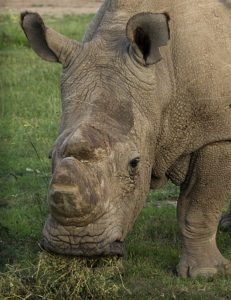Another Species Disappears and We’re the Reason
 Sudan, the last male northern white rhino, in 2015
Sudan, the last male northern white rhino, in 2015 Sudan, the last male northern white rhinoceros on the planet, is gone. He died at the Ol Pejeta Conservancy in Kenya last week due to complications associated with a severe leg infection. He was forty-five-years old. With Sudan gone, there are now just two northern white rhinoceroses left in the world, his daughter Najin and her daughter Fatu.
Northern white rhinos, a subspecies of the white rhino, used to live in areas of Africa north of the equator, but their numbers rapidly declined due to war and the poaching that funded it in the 1970s and ’80s. Conservationists attribute Sudan’s unusually long life to being confined in a zoo in the Czech Republic after being captured in 1975. Northern white rhinos were officially declared extinct (in all areas except for captive environments) in 2009.
Now, conservationists are focusing their efforts on keeping the species alive. They intend to impregnate southern white rhinos with cell cultures from a pool of twelve northern white rhinos and extracted eggs from Najin and Fatu. “This is a creature that didn’t fail in evolution,” Thomas Hildebrandt, who heads reproduction management at the Leibniz Institute for Zoo and Wildlife Research in Berlin, told the New York Times. “It’s in this situation because of us.”
For many, the death of Sudan actualizes the imminent loss of the northern white rhino subspecies and represents the failures of humanity to cohabitate our planet justly and sustainably. While conservation is the result of our collective concern for the continuation of populations, species, and ecosystems, it’s inherently reactive and anthropocentric. In practice, it manipulates (sometimes through hunting and fishing) entire populations for the “greater biotic good” while striping individual members of their dignity and autonomy—further perpetuating the harm we inflict. So long as we perceive other animals as representatives of their entire species, rather than as individuals, we will continue to behave in ways that drive extinctions.
And now more than ever we must focus our efforts on preventing and limiting our contribution to extinction events. Scientists have warned that we are currently undergoing a human-led great mass extinction. An assessment estimates that humans have sped up the rate of species extinction to roughly 1,000 times and the World Wildlife Fund reports that 67 percent of wildlife on earth could vanish by 2020.
Without doubt, biodiversity is essential to maintaining the delicate balance of life on this planet. We must take responsibility for our role in extinction events and address the economic and political interests that drive our destructive behavior. Although it may be too late to completely reverse the damage we’ve already done, it’s deeply humanistic to reevaluate our prejudices and extend our advocacy to prevent further acts of injustice.
